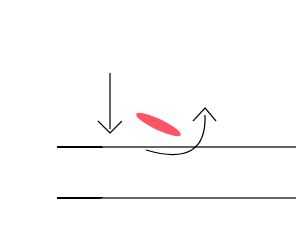Nice picture! When you say rotation, are you talking about using a picking motion that involves the forearm joint, i.e. forearm rotation? Because not all picking motions rotate. Elbow motion and wrist motion don’t rotate, for example. Here’s a comparison of what I’m talking about:
These are two different picking motions. The one that is curved is a combination of forearm and wrist, which is the most common way that forearm rotation is used in picking. The motion that is linear is wrist motion.
Anyway! I know that’s not exactly what you’re asking. But, the reason I say this is because very often, when picking motions feel stiff, trying other motions might present a different feeling, and you might be able to just “get it”, right away.
The second and more direct answer, which I should have given you first, is that there is no need to try to overcome the force of the string pushing on the pick. You can let the pick be loose in your grip, like Eric Johnson or Mike Stern. I call this “grip flop”. This will reduce the angle of attack when you hit the string, and the pick will slide over.
Grip flop almost always happens in my playing to some degree or another. Controlling how much flop helps you control loudness too. More flop = softer note, because the string is not pushing back as hard when the picks slides.
So finally, another thing you can do is look at your grip. If you’re hodling it very tightly, that can be the source of the issue you’re describing. And also, if you’re holding so much of the pick that only a tiny bit is exposed, then you will create a much more forceful pick attack even when you don’t want to, i.e. because there is less flop.
Also, grips that use the extended index finger can sometimes have more flop than grips which use a “trigger style” index finger and a fist, because there is more room for the pick to move, so you can experiment with the type of grip you use too.
Just some ideas! Let us know if that helps.

